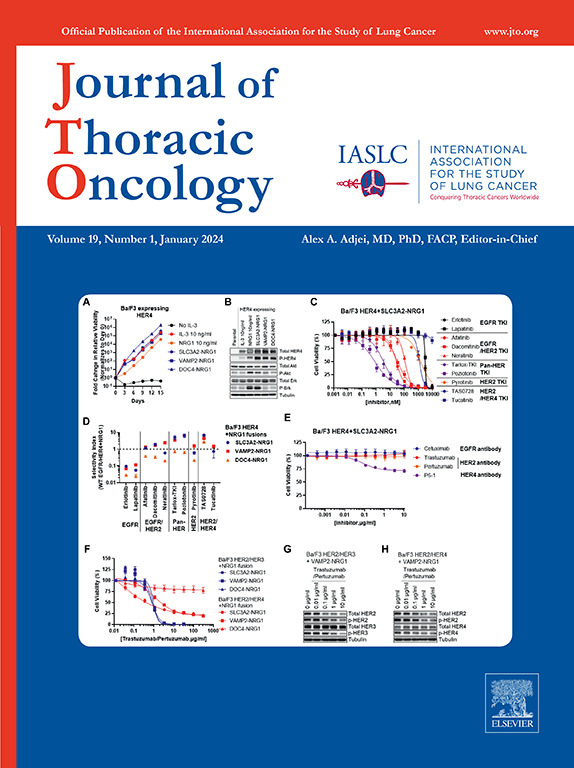Reducing Lung Cancer Mortality by Providing Smoking Cessation Support in the Lung Cancer Screening Setting: Missed Opportunities and Lessons Learned on Both Sides of the Atlantic
IF 21
1区 医学
Q1 ONCOLOGY
引用次数: 0
Abstract
National guidelines for the implementation of lung cancer screening (LCS) for high-risk older adults have been issued by several countries, largely in Europe, North America, and Australia. Typically, these guidelines recommend but do not specify how smoking cessation support (SCS) should be provided to patients undergoing LCS who currently smoke. As LCS implementation progresses, delivering screening to the millions of eligible individuals around the world, the lack of best practice guidelines for SCS in the LCS setting is resulting in a growing missed opportunity to reduce persistent tobacco and lung cancer-related disparities in incidence and mortality.
Quitting smoking at older ages reduces lung cancer risk and increases life expectancy. Compelling evidence from clinical trials and modeling studies has shown that, even with modest cessation rates, SCS delivered in the LCS setting can considerably reduce lung cancer mortality, with the potential to reduce global, racial, economic, and geographic disparities in lung cancer. Moreover, SCS interventions are cost-effective and can lead to significant cost savings for the health system.
On the basis of the evidence and lessons learned in the United Kingdom, Canada, and the United States, we propose a set of priorities for health systems to consider when developing or expanding SCS programs in the LCS setting. We argue that the system and policy changes needed to maintain SCS as a standard component of LCS are essential to capitalize on this important opportunity to integrate disease prevention with early detection, thereby maximizing the mortality benefit of LCS worldwide.
通过在肺癌筛查中提供戒烟支持来降低肺癌死亡率:大西洋两岸错失的机会和吸取的教训
一些国家(主要是欧洲、北美和澳大利亚)已经发布了针对高风险老年人实施肺癌筛查的国家指南。通常,这些指南建议但没有具体说明如何向目前吸烟的LCS患者提供戒烟支持(SCS)。随着LCS实施的进展,向全世界数百万符合条件的个体提供筛查,LCS环境中缺乏SCS最佳实践指南,导致越来越多的人错过了减少持续的烟草和肺癌相关发病率和死亡率差异的机会。老年人戒烟可以降低患肺癌的风险,延长预期寿命。来自临床试验和模型研究的令人信服的证据表明,即使在适度的戒烟率下,在LCS环境中提供SCS也可以显着降低肺癌死亡率,并有可能减少肺癌的全球、种族、经济和地理差异。此外,SCS干预措施具有成本效益,可为卫生系统节省大量费用。在英国、加拿大和美国的证据和经验教训的基础上,我们提出了一套优先事项,供卫生系统在LCS环境中发展或扩大SCS项目时考虑。我们认为,维持SCS作为LCS的标准组成部分所需的系统和政策变化对于利用这一重要机会将疾病预防与早期发现相结合至关重要,从而最大限度地提高LCS在全球的死亡率效益。
本文章由计算机程序翻译,如有差异,请以英文原文为准。
求助全文
约1分钟内获得全文
求助全文
来源期刊

Journal of Thoracic Oncology
医学-呼吸系统
CiteScore
36.00
自引率
3.90%
发文量
1406
审稿时长
13 days
期刊介绍:
Journal of Thoracic Oncology (JTO), the official journal of the International Association for the Study of Lung Cancer,is the primary educational and informational publication for topics relevant to the prevention, detection, diagnosis, and treatment of all thoracic malignancies.The readship includes epidemiologists, medical oncologists, radiation oncologists, thoracic surgeons, pulmonologists, radiologists, pathologists, nuclear medicine physicians, and research scientists with a special interest in thoracic oncology.
 求助内容:
求助内容: 应助结果提醒方式:
应助结果提醒方式:


